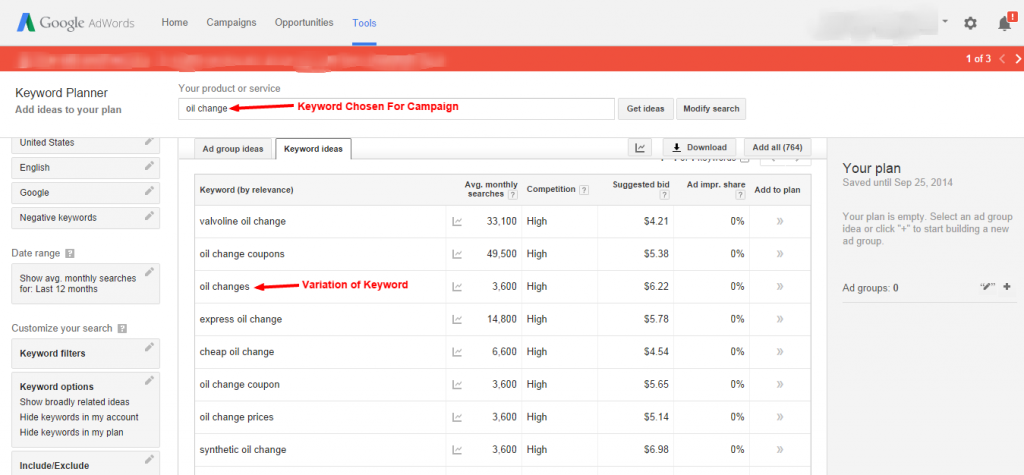AdWords Makes Changes to its Keyword Variations Settings
By:
Kim Clark
on 2/15/2014
Mid-August Google announced keyword changes that may effect the way you select keywords for PPC campaigns.
Between trying to navigate the tiny buttons on a mobile device and not caring about correct grammar doing a quick search for something, there are times when the wrong thing gets typed in for a search. We have all done it and we know that potential customers do it as well. To accommodate, are you adding in all of the possible spelling and grammar variations of the main keywords that you want your PPC ads to show up for?
I’m guessing you weren’t. Have no fear, Google has stepped up its game and made things a little bit easier for PPC account managers the world over.
What Changed?
On August 14 of this year, Google made the following announcement:
“People aren’t perfect spellers or typists. In fact, at least 7% of Google searches contain a misspelling. And the longer the query, the greater the likelihood of a typo. But even if what they’ve typed isn’t perfect, people still want to connect with the businesses, products, and services they’re trying to find.
Whether it’s “kid scooters”, “kid’s scooter”, or “kids scooters”, people interested in buying a scooter for their child want to see the most relevant ads despite slight variations in their search query. That’s why starting in late September, we’re applying close variant keyword matching, an intuitive way to connect people with the businesses they’re searching for, to all exact and phrase match keywords.”

What Does This Mean for My Campaigns?
This means that starting at the end of September, Google will be applying close variant keyword matching to all exact and phrase match keywords so you don’t have to enter them individually.
I’m guessing most of you won’t notice much of this change in your keyword entry processes because close variant matching was already the default setting for the campaigns that you had been building. Unless, of course you’re an advanced campaign manager who chooses to change the default settings to opt out of variant keyword matching default because you like to have more control over your matches. From now on, you advanced users will notice that when you build your campaigns, the option to disable close variants will no longer be offered- you will have to adjust your campaigns manually if you’re seeing a negative impact from these changes to variations.

For the rest of you, life will go on relatively unaffected. In other words, all Google has really done is make the default mandatory, and starting at the end of the month the exact and phrase match keywords that are being used in your campaigns will automatically begin matching to close keyword variations to better accommodate for spelling and grammar errors by the user.
Do I Have To Just Sit Here and Take It?
No, you don’t have to. Yes, Google has decided it will now automatically take these sorts of variations in to account for you, but you can stop it if you want to.
If you see that these changes are bringing traffic you don’t want (seen as clicks that are not profitable) you can simply add the keyword variations you don’t like as negative keywords in your campaign settings and Google will stop showing your ad for the incorrect terms.
The point here is that we now have even clearer information on what does or doesn’t drive valuable traffic to your site. Even if you didn’t think to add the outlying errors to your campaign directly, Google thought about it for you, which is pretty cool. It takes a village, people.

Is This Good A Good Change?
Yes, I think this is a good change to the way we think about keywords. It’s closer to the imperfect humans that are the life blood of our business models. After all, its people that buy things and do stuff, not computers, right?
The worst thing that can happen is that you might have to add some extra negative keywords to keep your traffic on target. The best thing that can happen is that you now are able to show up for a larger swath of your target audience. Plus, unprofitable variations of the main keywords that you are currently using are good to know about, and now you wont have to put in the extra effort of thinking up and adding these words yourself to see which side of the line they fall on.
Overall, this change is going to bring in more traffic on those marginal variations of your keywords that you may not have thought about before, and it will save you a lot of time if you are manually adding keyword variations. It will also help you understand your demographic in a way you may not have before, which is always a good thing. We’re (nearly) all human, after all.
Related Posts
AI and SEO: New Rules for Success
By:Jason Clark on 3/19/2025
AI has transformed traditional SEO strategies by enhancing content creation capabilities, analyzing detailed website data, and identifying trends that can inform strategic decisions.
Read More »Finding the Right Mix for Your Marketing: SEO vs Paid Search
By:Jason Clark on 3/28/2025
Aside from your email list (you DO have an email list, right?), search engines consistently drive some of the most valuable traffic for business websites. Users who actively seek your products or services through search engines are often ready to convert, making this traffic particularly valuable. At VIA Studio, we recommend a balanced approach: leveraging both Search Engine Optimization (SEO) and Paid Search (PPC) tactics. SEO offers sustainable, long-term growth, while Paid Search can deliver immediate results.
Read More »